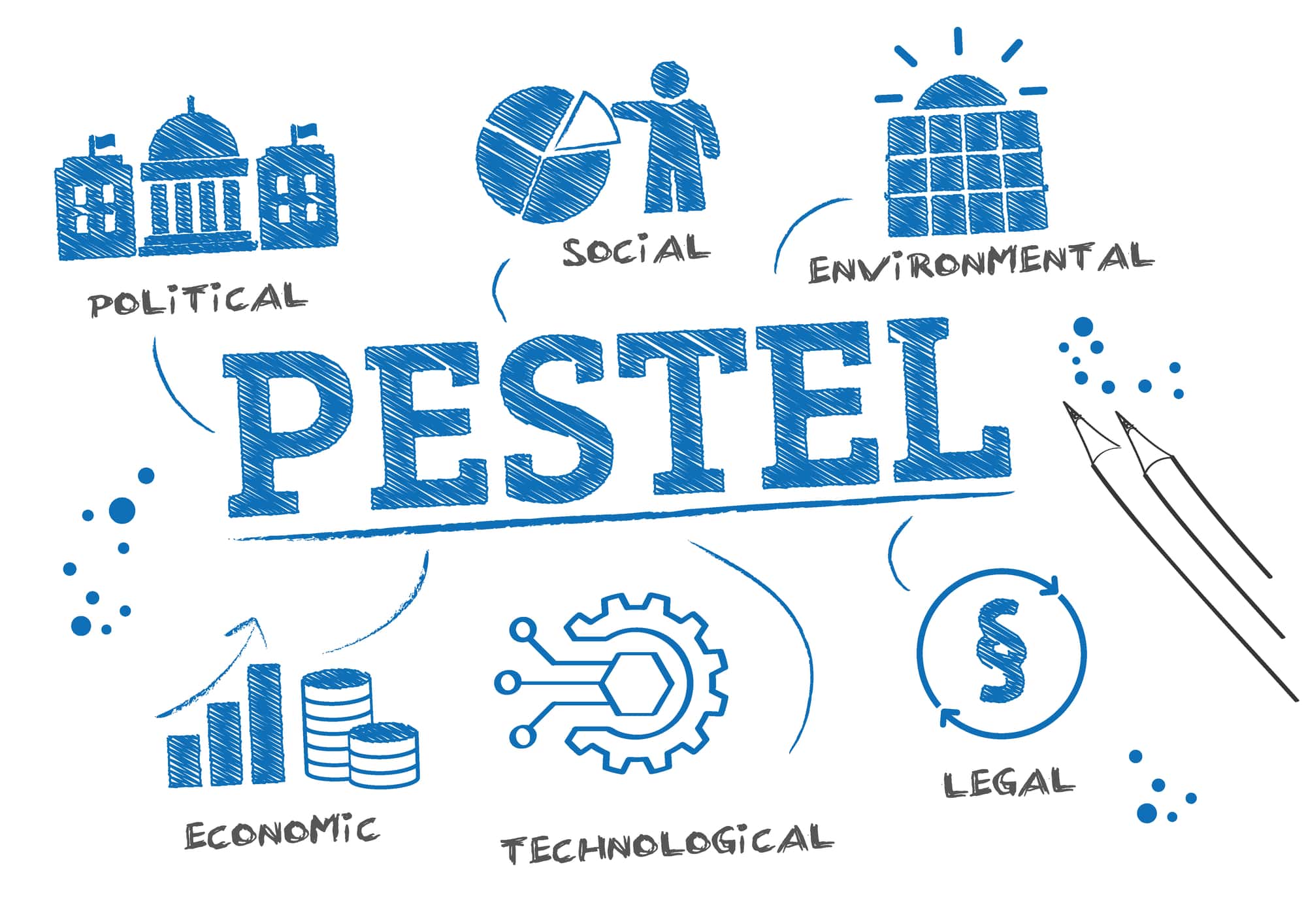Our PESTLE Analysis of The Real Estate Investment Trust (REIT) Industry highlights some of the external factors that impact the REIT industry.
Are you an individual with some extra money trying to look for good investment options? If yes, then you should definitely take out some time and read this article.
This article will discuss what the REIT industry is and how you can invest a small capital to gain massive returns.
Moreover, we will also conduct a PESTLE Analysis of The Real Estate Investment Trust (REIT) Industry through which we will highlight some of the external factors that impact the REIT industry.
Firstly, know should know what the REIT industry is. The REIT industry is full of REIT companies that invest in real estate from investors' money.

The REITs operate just like a mutual fund. People invest in REITs; they buy and rent properties in real estate to earn profits. 90% of these profits are distributed among the shareholders as dividends.
REITs started their operation in 1960 in the US after President Dwight D. Eisenhower approved the legislation for forming REITs.
The main purpose of approving REITs was to provide an opportunity for small investors to gain access to the real estate industry. Before that, people had limited options for investment.
For example, people used to invest in the capital market, mutual funds, or buy government bonds. However, after REITs became operational, people diversified their investments. As a result, they gained the opportunity to invest in real estate with small investments.
People loved the idea of REITs since they could get higher returns by investing in real estate than by buying government bonds. Moreover, they now had access to investing in real estate without getting into the hassle of getting directly involved in the real estate industry.
The REIT industry kept growing, and all the REITs currently own almost $4.5 trillion worth of property in the US. REITs in the US own approximately 535,000 properties and almost 15 million acres of timberland.
The concept of REITs was pitched by the US, and it transformed it into a reality. After looking at the benefits REITs are causing the US economy, more than 40 countries have adopted the REIT model.
Investments in REITs are considered a bit risky since there are a lot of macroeconomic variables that impact the REIT industry. However, high returns provide an incentive for investment to people.
Making an investment in the REIT does seem attractive. However, various external factors impact the returns people get by investing in them, so having complete knowledge of how various factors in an economic impact the REIT industry is really important.
This is why, today, we have decided to conduct the PESTLE analysis of the REIT industry. However, before conducting the PESTLE analysis of the REIT industry, we need to know what PESTLE analysis is.
PEST analysis is a tool that highlights various external factors that impact the operations of a business, industry, or country.
In today's PESTLE analysis, we will examine how various political, social, environmental, legal, technological, and economic factors affect the REIT industry. Then, let's proceed further and see how different external factors impact the REIT industry.

Political Factors Affecting The REIT Industry
This section of the PESTLE analysis discusses how different government policies impact a business, industry, or country. In addition, this section will analyze how different political factors affect the REIT industry.
The government's tax policies towards the REIT industry impact the REIT industry significantly. The government may provide tax incentives to investors who invest in the REIT industry.
By doing so, more people will be encouraged to invest in the REIT industry, and hence the REIT industry will flourish.
Besides that, government expenditure on infrastructure and development is significant for the REIT industry. Since the REIT industry is linked with real estate, the construction of roads and buildings increases the value of real estate.
As a result, government development projects would positively impact the REIT industry since they would make REITs more profitable.
Furthermore, political stability is extremely important for the growth of the REIT industry. As long as there is political stability, people make investments since there is less uncertainty. However, as the political turmoil begins, investors hold their money and stop investing.
This is why political stability is very important for the REIT industry because if there is political instability, investors don't invest.
Economic Factors Affecting The REIT Industry
Various economic factors impact industries operating in a country. This section will discuss what economic factors impact the REIT industry.
Economic growth is one factor that impacts the level of investment in a country. When a country is experiencing economic growth, people have high disposable incomes, so they invest their money in various industries.
The REIT industry also experiences an inflow of money when the economy is booming. However, in case of a recession, people hold their money and don't invest in the REIT industry.
Moreover, interest rates the central bank sets impact the REIT industry significantly. Suppose the central bank increases the interest rate and offers higher returns on government bonds than the investors would get by investing in REITs.
This will shift the investors from the REIT industry to the bond market, where they can simply buy government bonds and earn higher returns than what they were getting by investing in REITs.
Other than that, inflation levels also determine a country's investment level. For example, suppose a country is experiencing high levels of inflation. In that case, people in that country won't have access to money to invest in any sector.
Hence, low inflation levels suit the REIT industry because that's when people have high disposable incomes and invest in the REIT industry.

Social Factors Affecting The REIT Industry
This section analyses societal, demographic, and cultural factors affecting any industry. This section will analyze how different social factors impact the REIT industry.
Urbanization is a factor that directly impacts the REIT industry. As urbanization in a country increases, the value of urban property increases. As a result, the REITs make higher profits, and they can offer higher dividends to the investors.
Higher dividends incentivize investors, which is why more investors would be interested in investing in REITs. Besides that, the consumer behavior of individuals greatly impacts the REIT industry.
In countries with high savings rates, people save a significant portion of their income and invest it. Therefore, the REIT industry in countries with high savings rates flourishes because, in those countries, people have the money to invest in REITs. In countries with low savings rates, people don't have enough money to invest.
Other than that, the population also plays a significant role in impacting the REIT industry. Countries with high populations have a generally high value of real estate because the demand for property is high.
The REIT industry in such countries earns high profits because they get high returns by investing in real estate.
Technological Factors Affecting The REIT Industry
This section looks at how technology and innovation impact several businesses and industries. This section will analyze how several technological factors impact the REIT industry.
The advancements in data analytics prove to be a game changer in the REIT industry. Several data analytics tools available in the market can help REITs forecast future prices of properties. By using these data analytics tools, REITs can increase their profits.
Moreover, REITs can manage risks using risk management software and looking at data trends. This can help REITs in avoiding losses. Besides that, innovation in the real estate industry is helping the real estate industry to grow.
Different e-commerce platforms are emerging that trade in real estate. These innovations in the real estate sector are causing real estate to expand, and the value of properties is increasing due to increased demand.
Hence, the innovations in real estate are also causing the REIT industry to grow. Moreover, the profits of the REITs are also increasing with increasing property prices.
Furthermore, increasing internet users is also good for the REIT industry. This is because the internet provides awareness to its users, and people find more options to invest. Hence, as the internet becomes more accessible, the REIT industry will grow.
Legal Factors Affecting The REIT Industry
The legal framework and laws impact any industry significantly. Industries have to abide by the laws to avoid bans and penalties. This section of the PESTLE analysis analyses the legal factors that impact the REIT industry.
The criterion set by the government for the classification of a company as a REIT is very important for the REIT industry.
For example, suppose the government makes the requirements of establishing a REIT tough. In that case, companies won't be able to register as REITs, and the industry won't expand.
On the contrary, if the requirements are too simple, then there is a possibility that many companies that aren't capable of becoming REITs would be registered as REITs. Hence, this will be good for the REIT industry.
Furthermore, property laws impact the REIT industry significantly. If the property laws are simple and allow easy transfer of properties, then they would facilitate real estate to grow.
As a result, the REIT industry would also grow. Moreover, if there are high transfer costs and fees associated with property transfer, people would be reluctant to deal in real estate. Hence, the REIT industry would shrink.

Environmental Factors Affecting The REIT Industry
Environmental factors take the environment and natural resources into account. This section will discuss how different environmental factors impact the REIT industry.
Climate change is causing natural disasters to occur frequently worldwide. These natural disasters cause a lot of damage to buildings, houses, apartments, etc. To deal with this challenge, REITs does insurance for every property. But unfortunately, this increases the costs incurred by REITs. Hence their profits shrink.
Besides that, natural disasters also cause a lot of unemployment and cause people to suffer financially. This can lower their disposable incomes, so they might be unable to invest in REITs.
Besides that, as awareness about sustainable development has increased, people might demand REITs to invest in environmentally friendly properties.
This would make it challenging for the REITs because then they would be pressured by the investors to only invest in eco-friendly properties, even if they aren't profitable in terms of monetary value.
Besides that, as people are getting aware, they might ask companies operating in the REIT industry to adopt environmentally friendly practices by installing solar panels to run their offices on clean energy. Moreover, investors may prefer investing in a REIT that has adopted eco-friendly practices.

PESTLE Analysis of The Real Estate Investment Trust (REIT) Industry: Final Word
The REIT industry is a significant industry that enables investors to invest in real estate with small investments. Investing in REITs is just like investing in a mutual fund. REITs take money from investors and invest it in real estate. They make profits and give dividends to the investors.
REITs are an investment option similar to buying bonds or investing in the stock market. However, the returns investors get by investing in REITs are higher than what they can get by investing in government bonds.
The REITs became operational in 1960, and the REIT industry has grown and evolved since then. Currently, the REITs own more than $4.3 trillion worth of property. In addition, around 40 countries have adopted the model of REITs.
In today's PESTLE analysis, we discussed what the REIT industry is and how it is beneficial to invest in REITs. Moreover, the PESTLE analysis framework helped us highlight how some external factors impact the REIT industry.
If you liked reading this article and want to read more PESTLE analysis articles, look at some examples of the PESTLE analysis.


